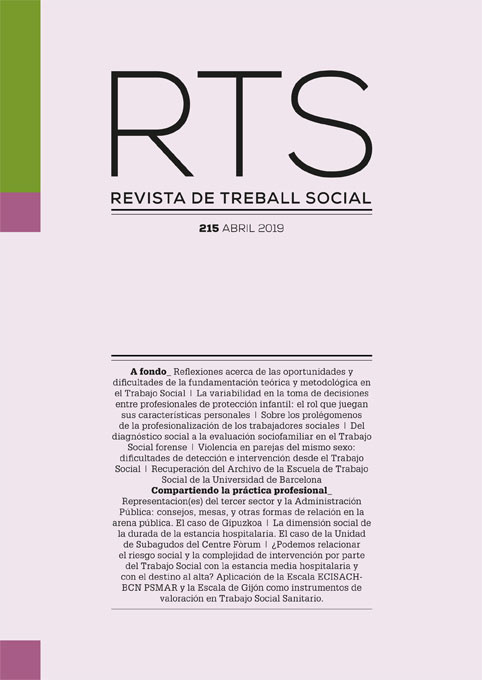The purpose of this article is to link the reasons for the poor theoretical and methodological foundations of social work to the thesis of (de)professionalisation. This paper offers an analysis of the discontentment felt by social workers in their professional activity, which affects their identity and their social recognition. The first part of the article sets out a conceptual framework on the system of professions, the thesis of de-professionalisation and the risks affecting social work in Spain. The second part presents discourse in relation to the object of this article: (a) weak knowledge monopoly, (b) the necessary feedback on the practice, (c) professional social work with academic social work, and (d) social work in relation to other professions. The methodology adopted involves a discourse analysis of fifty in-depth interviews with experts in social work. It is concluded that self-reflection, training and in-depth knowledge of the paradoxes of social work are key elements in transforming risks into potential.
Article
Reflections on the opportunities and difficulties surrounding the theoretical and methodological foundations in social work
Abbott, A. (1988). The System of professions: An essay on the division of expert labor. Chicago: University of Chicago Press.
Alonso, L. E. (1998). La mirada cualitativa en sociología. Madrid: Alianza Universidad.
Alonso, L. E., y Callejo, J. (1999). El análisis del discurso: del postmodernismo a las razones prácticas. Revista Española de Investigaciones Sociológicas, 88, 37-73.
Brezmes, M. (2008). El Trabajo Social en España: una profesión para la democracia. Murcia: Universidad de Murcia.
Brown, P., Lauder, H., y Ashton, D. (2011). The Global Auction: The broken promises of Education, Jobs and Incomes. Oxford: University Press.
Conde, F. (2009). Análisis sociológico del sistema de discursos. Cuadernos Metodológicos, 43. Madrid: Centro de Investigaciones Sociológicas.
Dominelli, L. (1996). Deprofessionalizing Social Work: Anti-Oppressive Practice, Competencies and Postmodernism. British Journal of Social Work, 26(2), 153-175. doi: 10.1093/oxfordjournals.bjsw.a011077
Dressel, P., Walters, M., Sweat, M., Clayton, O. Jr., y Chandler-Clayton, A. (1988). Deprofessionalization, Proletarianization, and Social Welfare Work. The Journal of Sociology & Social Welfare, 15(2), 113-131.
Fabricant, M. (1985). The Industrialization of Social Work. Social Work, 5, 389-395. doi:10.1093/sw/30.5.389
Gambrill, E. (2001). Social Work: An Authority-Based Profession. Research on Social Work Practice, 11(2), 166-175.
Harris, J., y White, V. (2013). A Dictionary of Social Work and Social Care. Oxford: Oxford University Press.
Healy, K., y Meagher, G. (2004). The Reprofessionalization of Social Work: Collaborative Approaches for Achieving Professional Recognition. British Journal of Social Work, 34, 243-260. doi: 10.1093/bjsw/bch024
Iturrieta, S. E. (2014). Sociología y Trabajo Social en el mercado laboral chileno. Un análisis sociológico. (Tesis doctoral inédita, Universidad de Granada, Granada.) Recuperado de http://digibug.ugr.es/handle/10481/30853#.VrmYNvnhBD8
Krmpotic, C. S. (2009). Identidad y alienación en Trabajo Social, en un contexto de reformas sociales, desprofesionalización y proletarización. Margen, 56, 1-10.
Larson, M. S. (1977). The rise of Professionalism: A Sociological Analysis. Berkeley: University of California Press.
Martín, M. (2013). La construcción de la identidad en Trabajo Social. Análisis de una trama hilvanada por sus personajes. (Tesis doctoral inédita, Universidad Complutense de Madrid. Facultad de Trabajo Social, Madrid.)
NASW (2008). Deprofessionalization and Reclassification. Recuperado de https://www.socialworkers.org/da/da2008/finalvoting/documents/ Deprofessionalization%20and%20Reclassification%20%202nd%20 Round%20Final%20-%20Clean.pdf
Randall, G. E., y Kindiak, D. H. (2008). Deprofessionalization or Postprofessionalization? Reflections on the State of Social Work as a Profession. Social Work in Health Care, 47(4), 341-354. doi: 10.1080/00981380802173855
Verde. C. (2008). La exigencia de renovación del Trabajo Social en contextos postbienestaristas. Revista de Treball Social, 184, 45-57.
Zamanillo, T. (2018). Epistemología del Trabajo Social. De la evidencia empírica a la exigencia teórica. Madrid: Ediciones Complutense





